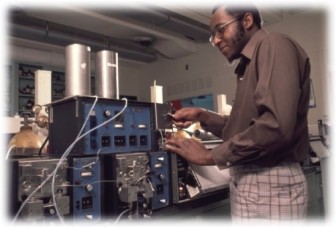Parker High School, Family And Community Helped Propel Top Scientist Dr. Willie May
College graduation is just days away for millions of students. A recent study shows there’s good news for grads looking for jobs in science, technology, engineering and math, also known as STEM fields. Dr. Willie May, a graduate of Birmingham’s Parker High School, struck out on a path in science more than 45 years ago, completing a chemistry degree at Knoxville College. Today, he’s one of nation’s chief scientists and heads the National Institute for Standards and Technology. Dr. May talks with WBHM’s Sherrel Wheeler Stewart about his work, how he got there and what science offers our nation’s youth.
What benefit does an education in science or technology offer graduates today?
“There are so many opportunities that you have as a scientist that you don’t have if you work in some other field. Scientists by our nature share our research results with the global community. The training you get as a scientist of assimilating information from diverse sources and making decisions, I think, prepare you for leadership positions in other areas.”
What sparked your interest in science?
“My mother had decided that I would go to college and the only way I could do that was to get a scholarship. My dad wanted me to play baseball. Back in those days in Birmingham, the big plants had teams – TCI, Conner Steel, Stockholm. If you played ball, you didn’t have to work very hard. Science intimidated folks, like it still does. This was the post Sputnik era. So if you had an aptitude for science, and pursued that, there was a great chance that you’d get a scholarship. My ambition was wearing a white lab coat and working in it, and not working in the steel mills and coal mines. So that was my vision for success.”
How do we attract youths today to the study of science and technology?
“I think we have to continually articulate the importance of science and technology to our well being as a society. I think we have to get kids to see that [science] it can be cool and exciting.”
Did you face barriers growing up in Birmingham in the 50s and 60s?
“Obviously growing up in Birmingham Alabama in the late 50s and 60s there were barriers, but fortunately I had lots of folks who invested a lot in me and I owed it to them not to allow those barriers to deter me.”
Can you tell us about the National Institute for Standards and Technology?
“We are doing science in any area of measurements in science that you could imagine. In 1901, we were developing the standards for light, light bulbs. Fast forward to 2016, we are researching advanced communication. We’re working with the buildout of of a nationwide LTE network for first responders. Every day has offered new challenges and an opportunity to see how my work and the work of the institution is making an impact on innovation, productivity and improve the quality of life not only in the U.S. but around the world.”
“There has not been one day in 45 years that I got up and said, “Dog, I got to get up and go to work today.”
Birmingham is 3rd worst in the Southeast for ozone pollution, new report says
The American Lung Association's "State of the Air" report shows some metro areas in the Gulf States continue to have poor air quality.
Why haven’t Kansas and Alabama — among other holdouts — expanded access to Medicaid?
Only 10 states have not joined the federal program that expands Medicaid to people who are still in the "coverage gap" for health care
Once praised, settlement to help sickened BP oil spill workers leaves most with nearly nothing
Thousands of ordinary people who helped clean up after the 2010 BP oil spill in the Gulf of Mexico say they got sick. A court settlement was supposed to help compensate them, but it hasn’t turned out as expected.
Q&A: How harm reduction can help mitigate the opioid crisis
Maia Szalavitz discusses harm reduction's effectiveness against drug addiction, how punitive policies can hurt people who need pain medication and more.
Gambling bills face uncertain future in the Alabama legislature
This year looked to be different for lottery and gambling legislation, which has fallen short for years in the Alabama legislature. But this week, with only a handful of meeting days left, competing House and Senate proposals were sent to a conference committee to work out differences.
Alabama’s racial, ethnic health disparities are ‘more severe’ than other states, report says
Data from the Commonwealth Fund show that the quality of care people receive and their health outcomes worsened because of the COVID-19 pandemic.








